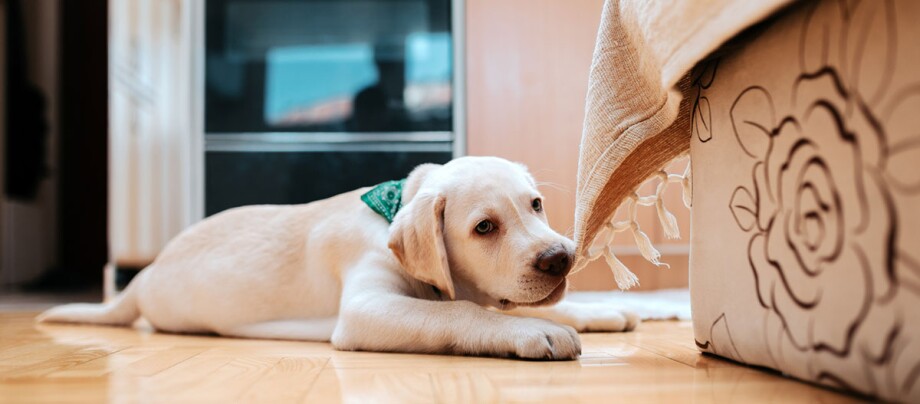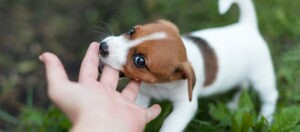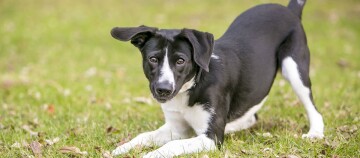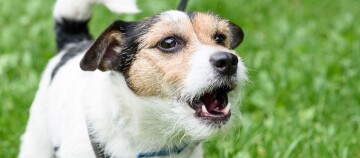Dog Chewing on Everything: How to Help Them Break the Habit!
07.10.2022 - Reading time: 5 minutes

Is nothing in your household safe from your dog? Your dog chews on everything, destroys pillows, chair legs look like beavers invaded, felt pens are destroyed and garbage bags are looted. This is not only annoying, but can be hard on your dog’s stomach or even put him in mortal danger. For you, however, the first thing to do is to stay calm and investigate the causes. Read in this guide how you can approach the matter and get rid of the destruction of objects without punishment.
Why do some dogs chew on objects?
As described above, many dog households look like this. But behind this supposed “destructiveness” is usually a clear cause that needs to be determined. Firstly, however, chewing on things is a normal dog behaviour. If it concerns puppies and young dogs, a tooth change is frequently the cause of the gnawing. Nevertheless, puppies also need to learn what they can and cannot chew on.
However, in adult dogs, unrestrained chewing often indicates other existing problems. The symptom of “destructiveness” can have psychological causes such as stress, anger or fear. The chewing is then a so-called displacement activity. In rare cases it can also indicate an organic disease of the dog, which is accompanied by a change of character.
Go on causal research
The first step is to find out why your four-legged bully is messing with your stuff. Only if you know the cause can you can take the appropriate action. Fighting the symptoms and scolding the dog will never lead to the desired success. The following reasons for the conspicuous behaviour of the dog are possible and should be considered by you:
Causes of chewing:
- Separation stress or anxiety
- Tooth change
- Adolescent playfulness and puberty
- Lack of challenge
- Stress due to overwork
- Psychological changes due to an organic disease (e.g. brain tumor)
Does your dog only chew on everything when he is alone? Then he may be bored or acting out of separation anxiety or stress. Read more about this in the Maxizoo’s guide “Leaving dogs alone.”
If you are not able to assess why your dog is destroying things yourself, you can consult a professional dog trainer, who will be able to better assess the situation from an animal psychology point of view. If you suspect organic illnesses in your dog, you should take your dog to the vet as soon as possible.
Half-strength bullies - puppies and dogs in adolescence
Chewing on objects is part of the normal behaviour of puppies. This is how they explore their world and, if necessary, also initiate teething. So you can’t blame your little darling. But puppies also have to learn what they can and cannot do.
For puppies and young dogs, first put everything that they could chew on in a safe place. Not just your favorite shoes, but especially power cords, cleaning supplies, and houseplants that may be poisonous to dogs. If you catch the puppy chewing, clearly speak the command “Off!” or “Leave it” and take the forbidden object out of his mouth. Instead, immediately offer him an alternative such as a toy or chew bone. Be careful, however, not to praise him with gestures or words at the same time. He should not perceive these as a reward.
During puberty, your dog may once again become overconfident and try to get his hands on all kinds of things. Here he will test his limits. Here again, patience and targeted training measures are required, which you have already practiced with him as a puppy. And think calmly: Puberty will pass.
Understimulation - dogs want to be engaged
Understimulation as a cause for chewing and destroying objects is unfortunately quite common. Your dog does not get enough exercise and mental activity during the day. This point is very often underestimated by dog owners, especially if you acquire special breeds. These include all the so-called working dogs such as a husky, border collie or Australian Shepherd. If you have one of these breeds or a mix thereof, then exercising together with your dog is a must. Maxi Zoo has compiled many nice tasks for you on the topic of “Dog Agility”.
All dogs need not only affection and petting, but also serious work tasks that are adapted to their species. For many – especially small breeds – it’s enough to combine daily exercise with species-appropriate play tasks. Try training games with your dog that challenge them mentally and physically. Search games or nose work is one of them. At the same time, observe whether your dog’s tendency to chew decreases with these consistent measures.
Teeth change in dogs
The change of teeth takes place between the fourth and seventh months in young dogs. In smaller dogs it may be later and in large breeds earlier. During this time, offer your dog special chews to get rid of the baby teeth and soothe the itchy gums while the new teeth grow in. This is because chewing also massages the gums.
Dogs also experience stress
Stress that causes conspicuous or even pathological behaviour, for example when your dog chews his own paws or licks manically, is often not recognized or even trivialized. Stress symptoms can be caused by an overload of environmental stimuli. They can also be a reaction to overly intense, “demanding” training and physical overload, for example, not species-appropriate jogging or cycling with the dog. Deep-seated grief or unclear relationships in the family circle as well as bullying among dogs can also lead to your four-legged friend’s destructive behaviour. In these cases, you should seek professional help from a dog trainer or even from trained animal psychologists.


